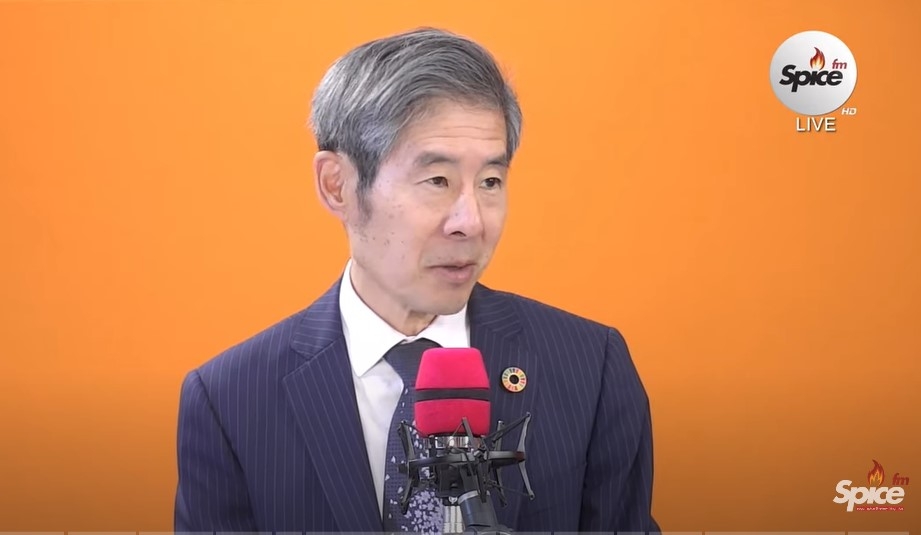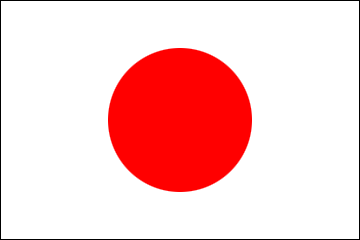Ambassador OKANIWA Ken’s Interview on the Audio-Visual Radio Programme “The Situation Room”
2024/1/16
On 16 January 2024, H.E. Ambassador OKANIWA Ken was interviewed on "The Situation Room", a current affairs programme, which was broadcast on the Kenyan audio-visual radio station Spice FM, and on KTN Home. A summary of the interview is below. The full conversation can be watched on this link.

1 (Question) Over the years, we have seen very many projects initiated by Japan, can you highlight a few?
(Ambassador’s Response) First of all, Kenya is the largest recipient of Japan’s bilateral Official Development Assistance in sub-Saharan Africa. Along the coast, Japan has supported the construction of the Moi International Airport in Mombasa. The recent support of the Mombasa Port Development Project expanded the area of the port by one third, and that is bringing in revenue for the Government, promoting more goods to be shipped in and out, and also helping the jobs and economy of the people.
The Mwea Irrigation Scheme where most recently, Thiba Dam was built is going to expand the network of irrigation so people will be able to plant rice and other agricultural produce where previously they could not grow because of lack of water.
Japan has supported the Olkaria Geothermal Power Plant. About half of the capacity for geothermal electricity is supported by cooperation from Japan, and today, what is remarkable is that the Kenyan engineers are able to explore for geothermal resources underground so that they know where they should build a new geothermal powerplant, and this is thanks to the training they have received in Japan.
The cooperation Japan has had with the Kenya Medical Research Institute (KEMRI) is allowing KEMRI to train medical experts from other countries in the region. This has really helped in dealing with the Corona Pandemic and other infectious diseases. Japan’s cooperation is not only about benefitting Kenya, but also benefitting the whole African region.
2 (Question) Aid from Western nations comes with conditions. These conversations are not heard from Japan. What does Japan ask for in return to giving Kenya aid?
(Ambassador’s Response) Japan's approach to supporting developing countries such as Kenya is different from other countries. Japan attaches utmost importance to the ownership of the recipient country. In Japan’s process of identifying how to cooperate with Kenya, Japan has intensive discussions on what the needs are and what the Kenyan Government wants to achieve. A lot of time is spent on these discussions so that the Kenyan Government is on the driver’s seat and Japan’s support is to try and achieve the self-reliance of the Government so that when the project is complete, the Kenyan Government can continue with that activity on it’s own.
3 (Question) Bilateral and multilateral loans always have an interest attached to it. When Japan lends Kenya money, what sort of percentages do you charge?
(Ambassador’s Response) Japan is currently supporting the Mombasa Gate Bridge. The interest rate provided for the loan on the Mombasa Gate Bridge is 0.1%, and the grace period is 12 years. Once the grace period is finished, it is a 40 years repayment period. This is a very concessional term when you consider that for a commercial loan from a foreign bank it’s about 10% interest rate, 2 years grace period, and 3 years repayment period.
Japan attaches importance to fair and transparent development finance. I think it is important to have fair and transparent development finance in order to promote accountability of what the Government is taking on.
4 (Question) How has Japan benefited through its development assistance to Kenya?
(Ambassador’s Response) I wouldn’t say there is a direct benefit to Japan or the Japanese people from all these projects that Japan has undertaken. But in general, the feeling of friendship between our two people is very strong and there are more Kenyans who feel they are more interested in visiting or studying in Japan. Maybe, it is because there is a lot of goodwill towards my country.
5 (Question) It is said that with Japan's declining birth rate and ageing population, Kenyans will be able to study and work in Japan, what is your view on this?
(Ambassador’s Response) At this point, Japan’s immigration policy does not really allow for a total liberalisation of immigration from Kenya. But we are at a stage where more and more young people in Kenya are interested in Japanese culture and also studying in Japan. This is a good start because in Japan, the best universities are national universities, and the annual tuition fee is about KES 500,000. When I meet Kenyans who send their children to study in the UK or the US and other countries and they pay about 10 times that amount, I don’t see any reason why they cannot afford sending their children to study in Japan, and we have excellent education.
Having more young students being educated in Japan will open up opportunities for them. In the first instance to be hired by Japanese companies based in Kenya. That will help them learn the Japanese work ethics or work culture. The next step will be, once they are more comfortable with the Japanese language, they may be able to start working in Japan.
A direct flight connecting Nairobi and Tokyo or Osaka will be a very big push for this kind of trend.

1 (Question) Over the years, we have seen very many projects initiated by Japan, can you highlight a few?
(Ambassador’s Response) First of all, Kenya is the largest recipient of Japan’s bilateral Official Development Assistance in sub-Saharan Africa. Along the coast, Japan has supported the construction of the Moi International Airport in Mombasa. The recent support of the Mombasa Port Development Project expanded the area of the port by one third, and that is bringing in revenue for the Government, promoting more goods to be shipped in and out, and also helping the jobs and economy of the people.
The Mwea Irrigation Scheme where most recently, Thiba Dam was built is going to expand the network of irrigation so people will be able to plant rice and other agricultural produce where previously they could not grow because of lack of water.
Japan has supported the Olkaria Geothermal Power Plant. About half of the capacity for geothermal electricity is supported by cooperation from Japan, and today, what is remarkable is that the Kenyan engineers are able to explore for geothermal resources underground so that they know where they should build a new geothermal powerplant, and this is thanks to the training they have received in Japan.
The cooperation Japan has had with the Kenya Medical Research Institute (KEMRI) is allowing KEMRI to train medical experts from other countries in the region. This has really helped in dealing with the Corona Pandemic and other infectious diseases. Japan’s cooperation is not only about benefitting Kenya, but also benefitting the whole African region.
2 (Question) Aid from Western nations comes with conditions. These conversations are not heard from Japan. What does Japan ask for in return to giving Kenya aid?
(Ambassador’s Response) Japan's approach to supporting developing countries such as Kenya is different from other countries. Japan attaches utmost importance to the ownership of the recipient country. In Japan’s process of identifying how to cooperate with Kenya, Japan has intensive discussions on what the needs are and what the Kenyan Government wants to achieve. A lot of time is spent on these discussions so that the Kenyan Government is on the driver’s seat and Japan’s support is to try and achieve the self-reliance of the Government so that when the project is complete, the Kenyan Government can continue with that activity on it’s own.
3 (Question) Bilateral and multilateral loans always have an interest attached to it. When Japan lends Kenya money, what sort of percentages do you charge?
(Ambassador’s Response) Japan is currently supporting the Mombasa Gate Bridge. The interest rate provided for the loan on the Mombasa Gate Bridge is 0.1%, and the grace period is 12 years. Once the grace period is finished, it is a 40 years repayment period. This is a very concessional term when you consider that for a commercial loan from a foreign bank it’s about 10% interest rate, 2 years grace period, and 3 years repayment period.
Japan attaches importance to fair and transparent development finance. I think it is important to have fair and transparent development finance in order to promote accountability of what the Government is taking on.
4 (Question) How has Japan benefited through its development assistance to Kenya?
(Ambassador’s Response) I wouldn’t say there is a direct benefit to Japan or the Japanese people from all these projects that Japan has undertaken. But in general, the feeling of friendship between our two people is very strong and there are more Kenyans who feel they are more interested in visiting or studying in Japan. Maybe, it is because there is a lot of goodwill towards my country.
5 (Question) It is said that with Japan's declining birth rate and ageing population, Kenyans will be able to study and work in Japan, what is your view on this?
(Ambassador’s Response) At this point, Japan’s immigration policy does not really allow for a total liberalisation of immigration from Kenya. But we are at a stage where more and more young people in Kenya are interested in Japanese culture and also studying in Japan. This is a good start because in Japan, the best universities are national universities, and the annual tuition fee is about KES 500,000. When I meet Kenyans who send their children to study in the UK or the US and other countries and they pay about 10 times that amount, I don’t see any reason why they cannot afford sending their children to study in Japan, and we have excellent education.
Having more young students being educated in Japan will open up opportunities for them. In the first instance to be hired by Japanese companies based in Kenya. That will help them learn the Japanese work ethics or work culture. The next step will be, once they are more comfortable with the Japanese language, they may be able to start working in Japan.
A direct flight connecting Nairobi and Tokyo or Osaka will be a very big push for this kind of trend.
